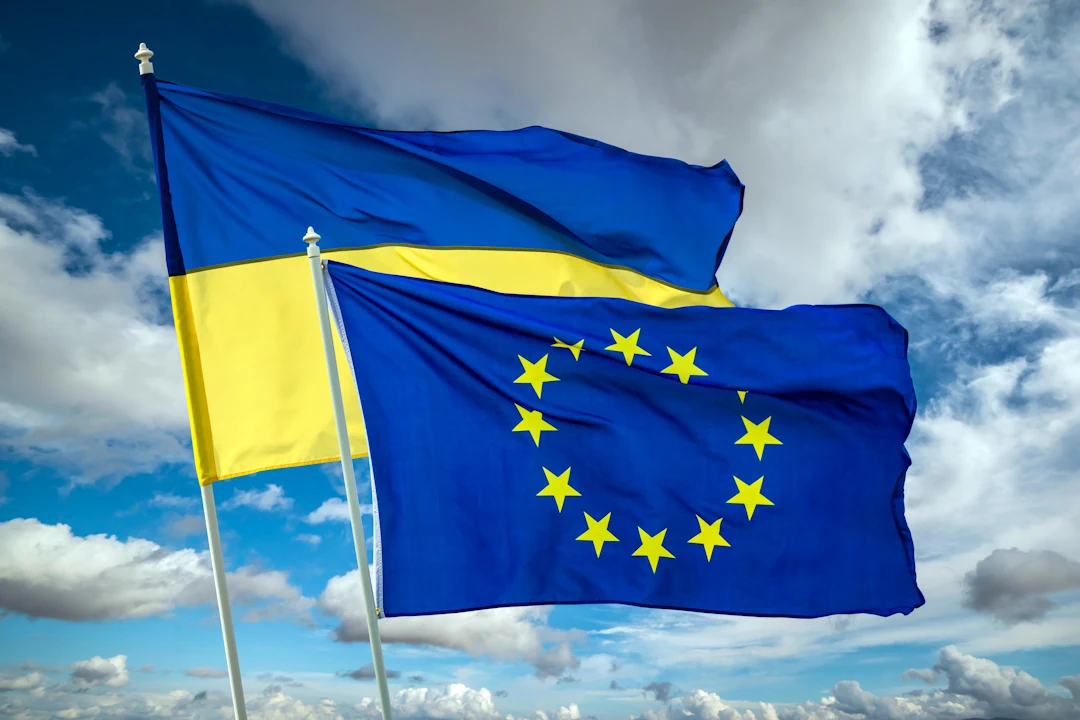25.09.2025
Trust, reforms, and EU integration: what Ukrainians think in 2025

The European Union Advisory Mission (EUAM) Ukraine and the Rating Group present the results of the annual nationwide Public Opinion Survey, offering a comprehensive picture of how Ukrainians perceive reforms, institutions, threats, challenges, and the country’s path toward EU membership.
Since 2015, EUAM Ukraine has commissioned this survey to ensure its support to Ukrainian partners is rooted in credible, evidence-based data. The 2025 results highlight encouraging trends in public trust of civilian security sector institutions, alongside clear challenges in areas crucial for reforms and European integration.
Trust in institutions
- Ukrainians continue to demonstrate strong confidence in their international partners. The European Union (63%), the International Monetary Fund (58%), NATO (54%), and the Council of Europe (53%) enjoy the highest levels of trust, while the United Nations (40%) and the OSCE (37%) are also seen as essential supporters of Ukraine.
- Among Ukrainian state security and law enforcement institutions, the National Guard of Ukraine (84%) and the Security Service of Ukraine (78%) are the two that enjoy the highest levels of trust. The State Border Guard Service (62%) and the National Police (48%) also record stable confidence levels.
- Younger Ukrainians (18–29) display particularly high confidence in security agencies, a reflection of their direct experience of the war and the crucial role these institutions play in protecting lives and communities. This trust also underlines that reforms are recognised by the younger generation, offering optimism that Ukraine’s future leaders see value in building resilient, EU-aligned public institutions even under conditions of war.
Attitudes towards EU integration and reforms
- A strong majority (68%) of Ukrainians believe that their country will succeed in implementing the necessary reforms for EU accession. At the same time, only 8% expect Ukraine to join the EU within one to two years. Most often, Ukrainians expect the accession to take place within five years (25%) or five to ten years (31%).
- The reforms viewed most positively by citizens are digital transformation (70% satisfied) and progress on gender equality (60%).
- The survey reveals continued dissatisfaction with anti-corruption efforts, with 86% of respondents expressing disapproval, making it the most pressing challenge to Ukraine’s reform agenda.
Evaluation of EU's support of Ukraine
- When asked about the most relevant forms of EU assistance, Ukrainians highlighted the fight against corruption (62%), support in investigating war crimes (44%), and assistance to liberated territories from the russian occupation (40%).
- Strategic communication was rated as the most effective area of EU support (55%), reflecting citizens’ demand for accurate and transparent information about the reform process.
- Nearly half of the respondents (49%) also consider EU accession consultations effective.
Challenges and hybrid threats
- The survey highlights public concern about hybrid threats from Russia, with 81% believing such threats are increasing.
- Online recruitment by russian special services (42%), fake news (32%), and cyberattacks (23%) are cited as the most concerning.
- Two-thirds of Ukrainians assess the country’s preparedness to counter hybrid warfare as moderate
Information sources and disinformation
- 51% of Ukrainians continue to rely on Telegram as their main source of information, with YouTube (25%) and personal networks (22%) also playing significant roles.
- At the same time, social media platforms such as Facebook and Instagram are viewed as the primary sources of disinformation (58%), followed by messenger channels (45%).
- Independent journalists and the Centre for Countering Disinformation (CCD) remain the most trusted actors in debunking fake news.
Veterans' reintegration
- Respondents identified post-traumatic stress and stress-related disorders (63%), disability (54%), and health problems (51%) as the main challenges facing veterans returning to civilian life.
- The majority (62%) see rehabilitation as the most important form of support.
- It is followed by employment opportunities (47%) and access to healthcare (43%).
Rating Group is one of Ukraine's largest research institutions, operating since 2008. The company is registered in Ukraine and has extensive experience in conducting sociological surveys in Ukraine and abroad. The group includes: Sociological Group Rating, Rating Lab research laboratory, Rating Online platform, and Rating Call Center.
Methodology
- Fieldwork dates: July 31 - August 5, 2025
- Survey method: CATI (Computer-Assisted Telephone Interviewing)
- Sample size: 2000 respondents
- Sample format: random sample of mobile phone numbers (the population of Ukraine aged 18 and older in all territories of Ukraine, except for the temporarily occupied territories of Crimea and Donbas, as well as the territories where Ukrainian mobile network was not available at the time of the survey). The results are weighted using up-to-date data from the State Statistics Service of Ukraine.
- Representativeness: the sample is representative by age, sex, and type of settlement (statistical error ≤ 2,2% with 0,95 confidence)



.webp)